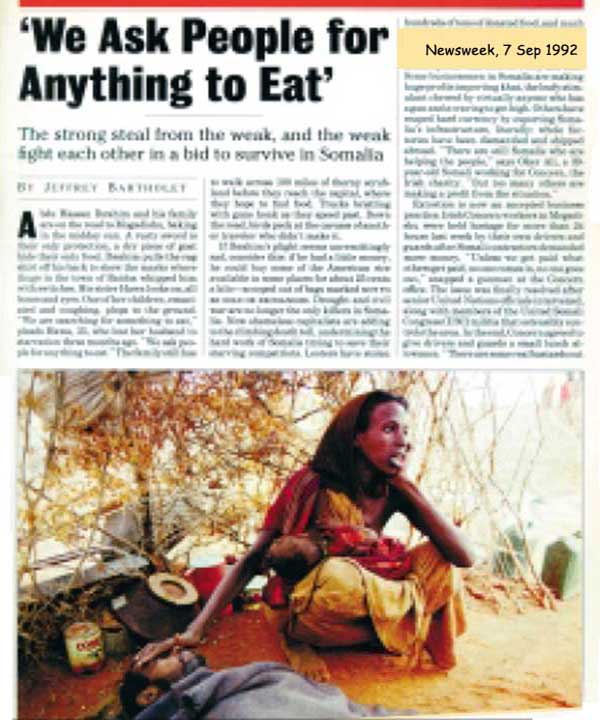The term capitalism means the sovereignty of capital, a free and unrestricted economic system totally based on profit and where society is in competition within these criteria. There are three important elements in capitalism: individualism, competition, and profit-making. Individualism is important in capitalism, because people see themselves not as a part of society, but as "individuals" standing alone on their own two feet who have to get by with their own efforts. "Capitalist society" is an arena where individuals compete with one another under very harsh and ruthless conditions. This is an arena just like that described by Darwin, where only the strong survive, where the weak and powerless are crushed and eliminated, and where ruthless competition holds sway.
According to the logic capitalism is based on, every individual–and this can be a person, a company, or a nation–must only fight for its own development and advantage. The most important criterion in this war is production. The best producers survive, the weak and incompetent are eliminated and vanish. This being the shape of the system, it is forgotten that those who are eliminated in the bitter struggle, those who are crushed and fall into poverty, are "people." What is seen as worthy of attention is not human beings, but economic development, and goods, the product of this development. For which reason the capitalist mentality feels no ethical responsibility or conscience for the person whom it crushes underfoot and climbs on top of and who has to live in great difficulty. This is Darwinism put into total practice in society in an economic way.
 |
| Herbert Spencer |
By proposing that it was necessary to encourage competition in all areas of society, and announcing that it was necessary to provide no opportunities or support for the weak in any field, from health to the economy, the foremost theoreticians of Social Darwinism prepared a "philosophical" and "scientific" support for capitalism. For example, according to Tille, a foremost representative of the Darwinist-capitalist mentality, it was a great error to try to prevent poverty by helping the "defeated classes," because that meant interfering with natural selection which brought about so-called evolution.119
In the view of Herbert Spencer, the main theorist of Social Darwinism, who introduced the principles of Darwinism to the life of society, if someone is poor then that is his mistake; nobody must help this person to rise. If someone is rich, even if he has acquired his wealth by immoral means, that is his competence. For this reason, the rich man survives, while the poor man disappears. This is the view which has come to prevail almost completely in today's societies and is a summary of Darwinist-capitalist morality.
Spencer, who defended this morality, finished his work Social Statistics in 1850, and opposed all systems of help offered by the state, precautions for the protection of health, state schools, and compulsory inoculation. Because according to Social Darwinism, social order arose from the principle of the survival of the strong. Supporting the weak and allowing them to survive was a breach of this principle. The rich are rich because they are better fitted; some nations rule others, because they are superior to them, some races fall under the yoke of others, because these others are more intelligent than them. Spencer applied the doctrine to human societies with a vengeance: "If they are sufficiently complete to live, they do live, and it is well they should live. If they are not sufficiently complete to live, they die, and it is best they should die."120
Graham Sumner, Professor of Political and Social Sciences at Yale University, was Social Darwinism's spokesman in America. In one of his writings he summed up his thoughts on human societies in these words:
…if we lift any man up we must have a fulcrum, a point of reaction. In society that means that to lift one man up we push another down.121
Richard Milner, senior editor of New York's American Museum of Natural History's Natural History Magazine writes:
One of Social Darwinism's leading spokesmen, William Graham Sumner of Princeton, thought millionaires were the 'fittest' individuals in society and deserved their privileges. They were "naturally selected in the crucible of competition."122
 |
PEOPLE SLEEPING IN THE STREETSPoor people left on the streets in a wealthy and comfortable countryÉ |
As has been seen from these announcements, Social Darwinists used Darwin's theory of evolution as a "scientific" comment on capitalist societies. As a result of this, human beings began to lose such concepts, which religion had brought with it, as mutual assistance, philanthropy, and co-operation, and instead of these virtues to give pride of place to selfishness, cunning, and opportunism. According to one of Social Darwinism's most important theorists, the American Professor E. A. Ross, "The Christian cult of charity as a means of grace has formed a shelter under which idiots and cretins have crept and bred.". Again in Ross' view, "The state gathers the deaf mutes into its sheltering arm, and a race of deaf mutes is in process of formation." Rejecting all these because they prevent natural evolutionary progress, Ross declared that "The shortest way to make this world a heaven is to let those so inclined hurry hell-ward at their own pace."123
As we have seen, Darwinism forms the philosophical basis of all the capitalist economic systems in the world and the political systems which take their shape from them.
It is for this reason that the greatest supporters of Social Darwinism were owners of capital. The rise of the strong by treading on the weak and the following of economic policies far removed from feelings of pity, help, and compassion were no longer to be condemned, because behaviour like this was accepted as in accordance with "scientific explanations" and "the laws of nature."
According to Richard Hofstadter, the author of the book Social Darwinism in American Thought, the nineteenth-century railroad magnate Chauncey Depew asserted that the men who attained fame, fortune, and power in New York City represented the survival of the fittest, through "superior ability, foresight and adaptability."124 Another railroad baron, James J. Hill, alleged that "the fortunes of railroad companies are determined by the law of the survival of the fittest."125
 |
In his biography Andrew Carnegie, another major owner of capital in America, states his belief in evolution with the words, "I had found the truth of evolution."126 Elsewhere he wrote these words:
It (the law of competition) is here; we cannot evade it; no substitutes for it have been found; and while the law may sometimes be hard for the individual, it is best for the race, because it insures the survival of the fittest in every department.127
In his article Darwin's Three Mistakes, the evolutionary scientist Kenneth J. Hsü, reveals the Darwinist thoughts of America's foremost capitalists:
Darwinism was also used in a defense of competitive individualism and its economic corollary of laissez-faire capitalism in England and in America. Andrew Carnegie wrote that the "law of competition, be it benign or not, is here; we cannot evade it." Rockefeller went a step further when he claimed that "the growth of a large business is merely a survival of the fittest; it is merely the working out of a law of nature."128
 |
It is exceedingly interesting that in America foundations such as the Rockefeller Foundation and the Carnegie Institution, founded by great capitalist dynasties such as Rockefeller and Carnegie, should give important financial support to research into evolution.
As has been seen from what has been explained so far, capitalism has dragged human beings to worship only money and the power that comes from money. By counting all kinds of religious and ethical values as nothing, societies influenced by evolutionary suggestions began to give importance to material power, and moved away from such feelings as compassion, mercy, and sacrifice.
This capitalist morality holds sway in almost all societies in our day. For this reason the poor, the helpless, and the crippled are denied charity, and are not looked out for or protected. Even if they fall victim to the most serious and lethal disease they are unable to find any body or humane aid to protect and help them recover. The poor man is left to his sickness and to death. In many countries such unjust and inhumane practices as little children ruthlessly being made to work and being left without any social rights are frequently encountered.
Today the reason for countries such as Ethiopia having drought-affected areas and living in starvation is the dominance of this capitalist morality. While aid and support from many countries could save these hungry people, they are abandoned to starvation and poverty.
 |
PEOPLE SUFFERING FROM HUNGERAlthough today there are considerable resources in the world, millions of children are abandoned to starve because of the capitalist mentality. |
Another feature of capitalist society is the way it gives room to inequality within itself. In societies of this kind the divide between rich and poor grows ever wider, as the poor grow poorer, the wealth of the rich grows greater. The existence of millions of homeless people and these people being left to live in the most inhumane conditions, even in America, the most highly developed country in the world, is a result of capitalist morality. Of course American society is wealthy enough to protect all these people and find them jobs. But because the prevailing mentality is not to let the poor rise, but to rise by treading on the poor, no solution is offered to these people. This is the result of the putting into practice of the Social Darwinists' claims that "In order to rise there has to be a stepping stone for one to tread on."
At this juncture, attention has to be drawn to an important point: Throughout history there have always been societies where the poor and weak were trodden down, where only material things were important, and where selfishness, self-interest, and cheating were seen as the only way to become rich: in the past too there lived people who thought only material things were of any worth and who were far removed from the features of any pleasing morality. But from the second half of the 19th century people with such views entered a very different period. For the last 150 years people and societies which possess this ruthless make-up have begun not to be condemned or criticised like the others. Behaviour of this sort began at last to be accepted as a law of nature. And at this point Darwinism had become a false religion justifying immorality and pitilessness.
 |
| The beggar and the destitute had some right to their wealth. (Surat adh-Dhariyat: 19) |
Robert E. D. Clark explains the situation this way:
Evolution, in short, gave the doer of evil a respite from his conscience. The most unscrupulous behaviour towards a competitor could not be rationalized; evil could be called good.129
And H. Enoch wrote in his book Evolution or Creation:
Prof J. Holmes says, "Darwinism consistently applied would measure goodness in terms of survival value"... This is the law of the jungle where "might is right", and the fittest survive. Whether cunning and cruelty, cowardice or deceit, whatever will enable the individual to survive is good and right for that individual or that society. 130
As we have seen, lack of religion and the Darwinism which inspired it lay behind all the people, systems, and ideologies which have brought worry, difficulty, pain, and hopelessness to the world, particularly in the last 150 years. Those who thought that they could protect their own interests in the selfish and ruthless environment brought about by lack of religion saw Darwinism as a saviour for themselves. They adopted Darwinism's thesis of "the weak disappear as the strong live" as a philosophy of life for themselves.
 |
 |
 |
| Those among you possessing resources and other means should not fail to give (something to) near relatives, paupers and those who are refugees for Allah's sake; let them act forgivingly and show indulgence. Do you not like Allah to pardon you? Allah is Forgiving, Merciful. (Surat an-Nur: 22) |
They were not aware of it, but these people who thought they were preparing a great trap for all of mankind, actually prepared it for themselves. Because no matter how much they struggle to survive and stay alive, there is actually one judge, one lord, and one Master, whether of themselves, of the whole world, of everything they try to possess, the leaders they bind themselves to, or the ideologies and "isms" they believe in. Allah is the one judge and power. And not the temporary power and opportunities given to human beings, the things they gain so ruthlessly by struggle and oppressing other people, by the sweat of their own brows. The wealth, strength, and power which a human being thinks he gains by himself are actually given to him by Allah to try him. No matter how much he may believe that he is in an arena of struggle where the weak are eliminated and the strong conquer, in actual fact every human being is living a test set by Allah for himself. Allah reveals in a holy verse that he tries human beings by means of the opportunities he gives them:
We made everything on the earth adornment for it so that We could test them to see whose actions are the best. (Surat al-Kahf: 7)
Those who think that they have won what they possess as the result of a "fight for survival" will feel a heart-rending pain for which there is no compensation, and great sorrow when they come face to face with reality in the hereafter and see what an empty idea they followed:
The Companions of the Garden will call out to the Companions of the Fire, 'We have found that what our Lord promised us is true. Have you found that what your Lord promised you is true?' They will say, 'Yes, we have!' Between them a herald will proclaim: 'May the curse of Allah be on the wrongdoers those who bar access to the Way of Allah, desiring to make it crooked, and reject the hereafter.' (Surat al-A'raf: 44-45)
The Companions of the Ramparts will call out to men they recognise by their mark, saying, 'What you amassed was of no use to you, nor was your arrogance. (Surat al-A'raf: 48)
As for those who have not been influenced by Darwinist-capitalist thinking and who have not forgotten the reason for their being in the world and the existence of Allah, they see other human beings as living things created by Allah. As Allah has ordered them, they always treat other human beings pleasantly, feel affection and compassion, and do everything that they possibly can to take away their difficulties and worries. They always speak the pleasantest words, look after the orphaned, help the sick and crippled, and protect and watch after them. People like this avoid sin and keep their duties to Allah as it is revealed in the Qur'an and are the most superior in Allah's Sight: they pay no attention to wealth, race, colour, class, ideology, or philosophy.
119- Alaeddin Şenel, Irk ve Irkçılık Düşüncesi (The Idea of Race and Racism), Ankara: Belem ve Sanat Yayınları, 1993, p. 61
120- Herbert Spencer, Social Status, 1850, p.414-415
121- The Challenge of Facts and Other Essays, as quoted in Mason Drukman, Community and Purpose in America: An Analysis of American Political Theory, New York: McGraw-Hill, 1971, p. 202.
122- R. Milner, Encyclopedia of Evolution 1990 p. 412
123- Thomas F. Gossett, Race: The History of an Idea in America, Dallas: Southern Methodist University Press, 1963, p. 170
124- Chauncey Depew, My Memories of Eighty Years, New York, 1922, pp.383-384
125- James J. Hill, Highways of Progress, New York, 1910, pp. 126, 137
126- Andrew Carnegie, Autobiography, Boston 1920, p. 327, cited in Richard Hofstadter, Social Darwinism in American Thought, Boston: Beacon Press, 1955, p. 45
127- Andrew Carnegie, Wealth, North American Review 148, 1889, s. 655-657, cited in Richard Hofstadter, Social Darwinism in American Thought, Boston: Beacon Press, 1955, pp. 45-46
128- Kenneth J. Hsü, "Darwin's Three Mistakes”, Geology, vol.14, June 1986, p. 534
129- Bolton Davidheiser, W E Lemmerts (ed) Scientific Studies in Special Creationism, 1971 p. 338-339.
130- H. Enoch, Evolution or Creation, 1966 p.145